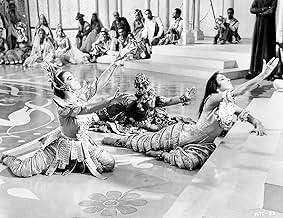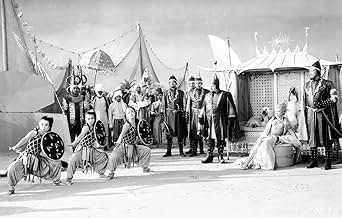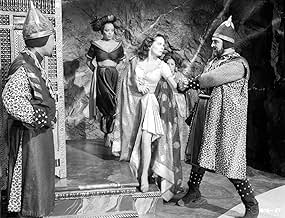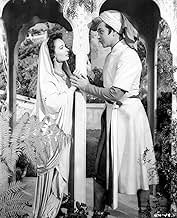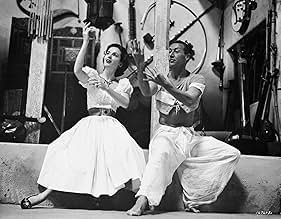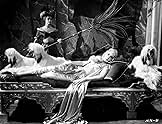CALIFICACIÓN DE IMDb
6.3/10
1.8 k
TU CALIFICACIÓN
Un pícaro poeta se hace con las riendas del harén del intrigante Visir mientras finge ayudarle a usurpar al joven califa.Un pícaro poeta se hace con las riendas del harén del intrigante Visir mientras finge ayudarle a usurpar al joven califa.Un pícaro poeta se hace con las riendas del harén del intrigante Visir mientras finge ayudarle a usurpar al joven califa.
- Dirección
- Guionistas
- Elenco
Ray Aghayan
- Brave Shopkeeper
- (sin créditos)
Ed Agresti
- Nobleman
- (sin créditos)
Richard Alameda
- Nobleman
- (sin créditos)
Suzanne Ames
- Harem Showgirl
- (sin créditos)
Jan Arvan
- Manservant
- (sin créditos)
William Bagdad
- Wholesaler
- (sin créditos)
Ross Bagdasarian
- Fevvol
- (sin créditos)
Rama Bai
- Plump Ayah
- (sin créditos)
Opiniones destacadas
KISMET was originally a play by Edward Knobloch written about 1910, and used as a vehicle for many years by the popular Broadway character actor Otis Skinner, playing the role of Hajj, the philosophical thief who saves the Caliph of Baghdad. Skinner even did a silent film version of the play. Two years after his death in 1942 a sound version of the film (in color) was made starring Ronald Colman, Marlene Dietrich, and Edward Arnold. The movie was a success, but nobody realized it would shortly become extremely successful in a new way. A song writing team (Bob Wright and Chet Forrest) constructed a score for KISMET based on the melodies of Alexander Borodin. The score contained such songs that became standards as STRANGER IN PARADISE (from the "Polevetsian Dances" in the opera PRINCE IGOR), BAUBLES, BANGLES, and BEADS, THIS IS MY BELOVED, THIS WAS THE NIGHT OF MY LIFE, and others. Wright and Forrest would do this several times on Broadway (they composed reset themes by Heitor Villa Lobos in another musical, for example) but KISMET was their joint masterpiece. So successful were they at rejuvenating the old Knobloch play, it was eventually revived again in the late 1990s in a new form as TIMBUCTOO (reset from the Califate of Baghdad to the great African trade city).
Eventually the musical came to the attention to the Freed unit at MGM, and Vincent Minelli was chosen to direct this 1955 version. The musical expanded on the play a little. Howard Keel (as Hajj - the name was restored to the original one, not Hafiz as Ronald Colman was named in the 1944 version) is involved at the beginning with Jay C. Flippen as a violent bandit leader who is seeking his son, and whom Hajj suggests will be found in Baghdad. We see Flippen from time to time looking for his missing son. In the end he does find the son (who lives up or down to Flippen's own reputation).
Keel had the right voice for Hajj, as did Dolores Gray as Lalume, the Vizier's bored wife (Dietrich in the 1944 film). Ann Blyth played Hajj's daughter Marsinah (who falls for the Caliph, Vic Damone). The evil vizier was played by Sebastian Cabot, and his rival government figure Omar (played by Harry Davenport in the 1944 film) is now played by Monty Wooley, in his final major movie part.
Actually the musical is livelier than it's critical history suggests. The old creaky play may turn off many critics, but it had some color, and the Borodin-inspired melodies raised it. But like BRIGADOON, Minelli could not shoot the film on location as it would have been incredibly expensive. Possibly the studio sets may have effected how the film was received by the critics. But it is entertaining, and (because of the music) very memorable. If some numbers were cut most of the big numbers were saved. Besides, I'd rather hear Keel sing A FOOL SAT BENEATH AN OLIVE TREE than hear Cabot (a questionable singing talent) try WAS I VIZIR. I don't think Sebastian Cabot even tried to sing once on FAMILY AFFAIR...his was a distinguished speaking voice, not a singing one.
Eventually the musical came to the attention to the Freed unit at MGM, and Vincent Minelli was chosen to direct this 1955 version. The musical expanded on the play a little. Howard Keel (as Hajj - the name was restored to the original one, not Hafiz as Ronald Colman was named in the 1944 version) is involved at the beginning with Jay C. Flippen as a violent bandit leader who is seeking his son, and whom Hajj suggests will be found in Baghdad. We see Flippen from time to time looking for his missing son. In the end he does find the son (who lives up or down to Flippen's own reputation).
Keel had the right voice for Hajj, as did Dolores Gray as Lalume, the Vizier's bored wife (Dietrich in the 1944 film). Ann Blyth played Hajj's daughter Marsinah (who falls for the Caliph, Vic Damone). The evil vizier was played by Sebastian Cabot, and his rival government figure Omar (played by Harry Davenport in the 1944 film) is now played by Monty Wooley, in his final major movie part.
Actually the musical is livelier than it's critical history suggests. The old creaky play may turn off many critics, but it had some color, and the Borodin-inspired melodies raised it. But like BRIGADOON, Minelli could not shoot the film on location as it would have been incredibly expensive. Possibly the studio sets may have effected how the film was received by the critics. But it is entertaining, and (because of the music) very memorable. If some numbers were cut most of the big numbers were saved. Besides, I'd rather hear Keel sing A FOOL SAT BENEATH AN OLIVE TREE than hear Cabot (a questionable singing talent) try WAS I VIZIR. I don't think Sebastian Cabot even tried to sing once on FAMILY AFFAIR...his was a distinguished speaking voice, not a singing one.
Given the times we're in and the changing public tastes in music, I'm not sure how well a revival of Kismet as a Broadway show would do today. Certainly the music of Alexander Borodin remains timeless, but a show with an Arabian Nights setting, I'm not sure would go over so well right now.
The Broadway show with Alfred Drake, Doretta Morrow, Richard Kiley, and Joan Diener ran for 583 performances in the 1953-54 season and won a Tony Award. As none of those worthy performers were movie names, Arthur Freed recast the film with MGM players Howard Keel, Ann Blyth, Vic Damone, and Dolores Gray and I've sure got no complaints about any one of them.
But Kismet has an older an more varied history. It was first presented on Broadway as a straight dramatic play in 1911, written by Edward Knoblauch and providing a career role as Hajj the beggar king for Otis Skinner. He must have done the role a gazillion times on Broadway and in touring companies.
Skinner even did two films, a silent and early sound version that I believe are both lost. It then got a film version with Ronald Colman as Hajj and it co-starred Marlene Dietrich, James Craig and Joy Page. Colman spoke the lines in the inimitable Colman fashion, but the music score that Harold Arlen and E.Y. Harburg wrote was singularly bland.
Nothing bland about the themes of Alexander Borodin which Robert Wright and Chet Forrest arranged and wrote lyrics for to provide a far better musical score. Two songs, Strangers In Paradise and Baubles Bangles And Beads were chart toppers in the first half of the Fifties. I well remember as a child hearing both played on the radio a lot.
The plot of the story centers around the nimble tongued Keel as Hajj who gets himself involved in palace politics with the Wazir/Prime Minister of the old Caliphate of Bagdad played by Sebastian Cabot and his wife Dolores Gray who's taken a real fancy to Keel. At the same time the Caliph on one of his nocturnal wanderings of legend has fallen for Keel's daughter Ann Blyth. The Caliph is played by Vic Damone. Both plot elements come together for an inevitable conclusion which I think you can figure out.
Vincente Minnelli did a great directing this old chestnut, impeccably cast with great musical performers. Songwriting because of who inspired it, doesn't get any better than this.
The Broadway show with Alfred Drake, Doretta Morrow, Richard Kiley, and Joan Diener ran for 583 performances in the 1953-54 season and won a Tony Award. As none of those worthy performers were movie names, Arthur Freed recast the film with MGM players Howard Keel, Ann Blyth, Vic Damone, and Dolores Gray and I've sure got no complaints about any one of them.
But Kismet has an older an more varied history. It was first presented on Broadway as a straight dramatic play in 1911, written by Edward Knoblauch and providing a career role as Hajj the beggar king for Otis Skinner. He must have done the role a gazillion times on Broadway and in touring companies.
Skinner even did two films, a silent and early sound version that I believe are both lost. It then got a film version with Ronald Colman as Hajj and it co-starred Marlene Dietrich, James Craig and Joy Page. Colman spoke the lines in the inimitable Colman fashion, but the music score that Harold Arlen and E.Y. Harburg wrote was singularly bland.
Nothing bland about the themes of Alexander Borodin which Robert Wright and Chet Forrest arranged and wrote lyrics for to provide a far better musical score. Two songs, Strangers In Paradise and Baubles Bangles And Beads were chart toppers in the first half of the Fifties. I well remember as a child hearing both played on the radio a lot.
The plot of the story centers around the nimble tongued Keel as Hajj who gets himself involved in palace politics with the Wazir/Prime Minister of the old Caliphate of Bagdad played by Sebastian Cabot and his wife Dolores Gray who's taken a real fancy to Keel. At the same time the Caliph on one of his nocturnal wanderings of legend has fallen for Keel's daughter Ann Blyth. The Caliph is played by Vic Damone. Both plot elements come together for an inevitable conclusion which I think you can figure out.
Vincente Minnelli did a great directing this old chestnut, impeccably cast with great musical performers. Songwriting because of who inspired it, doesn't get any better than this.
I saw this movie version and have always loved it. I also saw the stage version, but who could be better than Howard Keel. I felt like a "Stranger In Paradise." I have always been a movie musical buff and a big fan of Mr. Keel. When I first saw the movie as a child, I felt transported back to that time period (even if it was a Hollywood movie). The beautiful music and romance contained within makes you feel wonderful. And you can imagine all the romance, adventure and "Baubles, Bangles and Beads" you could ever wish for and all in the time and space of this lovely movie with beautiful music. Thank you Howard Keel, Ann Blyth, Vic Damone and company for one of my favorite movie memories.
I first saw this movie when I was 10 years old with my parents. I fell in love with Ann Blyth and wanted to grow up and marry her someday. Seeing her in the Student Prince also helped. This was a great musical of the time. Younger people, when seeing this movie today (1999) must take into consideration that we had different morality then. Men,as well as women,liked movies for the romance . We were not looking for cheap sex scenes or showing a lot of skin. Ahhh.., the butterflies in the stomach and heart palpitations of being in love. Jane Powell was another heart throb of the time. See her movies also. I only wished I could have gown up and looked like and sang like Howard Keel.
Kismet isn't a complete waste of time but director Minelli was itching to do Lust for Life and had little enthusiasm for this assignment, which engaged his abilities, but not his sympathies. Unfortunately, it shows. Like Brigadoon and a few other musicals, this was one case where the Freed factory failed despite some gorgeous singing by the principals (Vic Damone is no actor but he ravishes "Stranger in Paradise"). Some numbers are shorn from the score, which doesn't hurt much but some are added, which does. There's a stale, formulaic quality to this movie and Kismet is a hothouse flower that doesn't thrive under M-G-M's "crunch-it-out" treatment. More imagination and taste were needed. There are several good recordings of the score and I'd suggest that, if you like the music (what's not to like?), you experience Kismet aurally.
¿Sabías que…?
- TriviaIt was Vernon Duke who suggested Bob Wright and Chet Forrest use the music of Aleksandr Borodin as a basis for their score.
- ErroresPrior to the start of "Not Since Nineveh", Dolores Gray takes the gold purse from the Wazir to throw coins. When she's finished, she tosses it back to Sebastian Cabot which the actor fumbles and drops at his feet. During the song, the bag disappears and reappears at times and ends up behind his feet. It finally disappears by the end of the dance.
- Citas
Chief Policeman: [the Poet has just been sentenced by the Wazir, and the Chief Policeman enters to find him and Lalume, the Wazir's wife, kissing] What kind of a sentence did he get?
- ConexionesFeatured in MGM Parade: Episode #1.12 (1955)
- Bandas sonorasOverture
(uncredited)
Music and Lyrics by Bob Wright and Chet Forrest
Based on Themes by Aleksandr Borodin Performed by the MGM Studio Orchestra Conducted by André Previn
Selecciones populares
Inicia sesión para calificar y agrega a la lista de videos para obtener recomendaciones personalizadas
- How long is Kismet?Con tecnología de Alexa
Detalles
- Fecha de lanzamiento
- País de origen
- Idioma
- También se conoce como
- Kismet
- Locaciones de filmación
- Metro-Goldwyn-Mayer Studios - 10202 W. Washington Blvd., Culver City, California, Estados Unidos(studio: made in Hollywood, U.S.A. by)
- Productora
- Ver más créditos de la compañía en IMDbPro
Taquilla
- Presupuesto
- USD 2,692,960 (estimado)
Contribuir a esta página
Sugiere una edición o agrega el contenido que falta

Principales brechas de datos
What is the French language plot outline for Un extraño en el paraíso (1955)?
Responda

